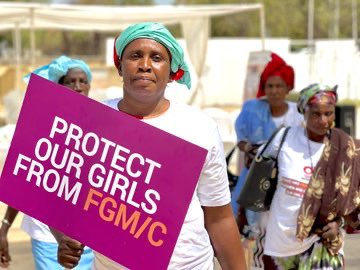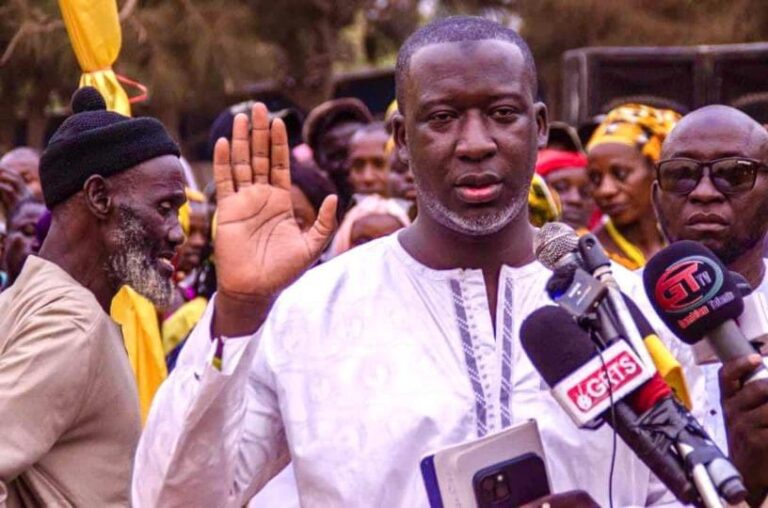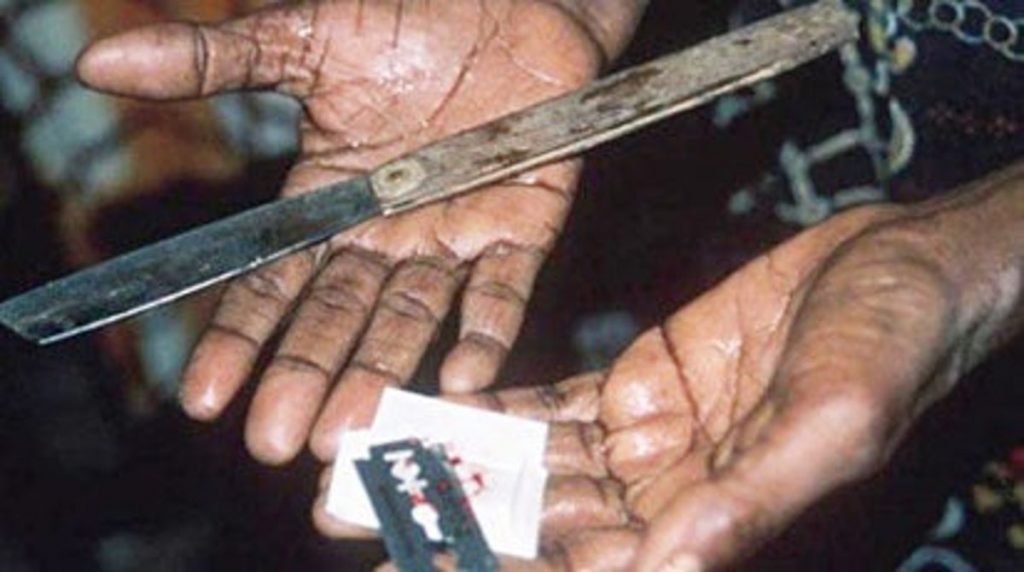Gambian lawmakers voted to uphold a 2015 ban on female genital mutilation, rejecting the controversial bill seeking to overturn the law after months of heated debate and international pressure. There were concerns Gambia’s bill could embolden a budding movement of pro-FGM activism in Africa hinged on self-determination and the right to choose.
The ban, in place since 2015, saw a significant decrease in FGM prevalence in Gambia, but proponents of the reversal argue genital cutting upholds religious and cultural values. Rights groups and the United Nations had urged MPs to reject the bill, saying it threatened years of progress and would have seen Gambia become the first country to overturn a ban on the genital cutting of girls and women.

FGM involves the partial or total removal of the female external genitalia or other injury to the female genital organs and can lead to serious health problems including infections, bleeding, infertility, and complications in childbirth. Gambia is among the 10 countries with the highest rates of FGM, with 73% of women and girls aged 15 to 49 having undergone the procedure, according to 2024 figures from UNICEF.
The current debate in Gambia over FGM erupted in August after three women were convicted of engaging in the practice. They had been the first to be prosecuted since the ban had been imposed and they faced a potential prison sentence of up to three years or a fine of about $740.
Proponents of the ban celebrated because it seemed the law was finally being enforced.
Then came the backlash. One of Gambia’s most prominent imams, Abdoulie Fatty, paid the women’s fines, saying the practice had been taught by the prophet Muhammad. Fatty then launched a campaign to overturn the ban. Many Muslim leaders have condemned the practice, and in many Muslim-majority countries, it is not widespread.
Gambian lawmaker Almaneh Gibba from the Alliance for the Patriotic Reorientation and Construction (APRC), which was supported by Imam Abdoulie Fatty, started his campaign to overturn a 2015 ban on female genital mutilation after the West African country imposed its first fines on those found guilty of the practice last year. Gibba belongs to a faction of the former ruling Alliance for the Patriotic Reorientation and Construction (APRC) of exiled ex-president Yahya Jammeh.
The convictions also prompted a backlash among Gambia religious leaders and inspired Gibba’s push to overturn the 8-year ban on what he calls female circumcision. Gibba, an independent MP and government critic, claims the ban was not wanted by most people in Gambia, a predominantly Muslim country where some believe cutting a part of the clitoris is required by Islam and key to a girl’s passage to womanhood. Gibba’s bill passed in its second reading in March with only four out of 53 MPs in the predominately male assembly voting against it.
The most recent government health survey in 2019-20 found that 46% of circumcised Gambian women between the ages of 15 and 49 believed the practice should be discontinued. Around 40% of men felt the same way.
However, Gibba’s opinions do not reflect realities on the ground, particularly the views of excised women on a practice that the United Nations considers a serious human rights violation and a form of torture.
Parliament is considering a bill proposed by Gibba to the alarm of advocacy groups who say it represents a step backwards in efforts to end a practice that can cause myriad health issues.
Gambia’s former vice president Isatou Tourayis now Gambia’s highest-profile campaigner against the practice.
Around 180 civil society organisations signed an open letter in October urging Gambia’s government to uphold the anti-FGM law.
The Women’s (Amendment) Act, 2015 – a pivotal milestone in advancing gender equality – is the culmination of years of advocacy, community engagement, and education aimed at eradicating this harmful practice and meeting the Sustainable Development Goal targets (5.3). It is, therefore, crucial that these legal protections remain in place. TThus, the decision to maintain the FGM ban aligns with The Gambia’s international and regional commitments to prevent harmful practices against girls and women, consistent with the Convention on the Rights of the Child (CRC), the Convention on the Elimination of All Forms of Discrimination Against Women (CEDAW), the African Charter on the Rights and Welfare of the Child, and the Maputo Protocol protecting African women’s rights.
The bill’s rejection comes after a second reading of the bill was passed in March with five out of 53 lawmakers voting against the bill at the time. Rejection of the bill came during its third reading, making the bill ineligible for a final vote.
If the bill had passed, Gambia would have become the first country in the world to reverse a genital mutilation ban.
More than half of the women between 15 and 49 years old in Gambia have endured genital mutilation, as estimated by the United Nations.
Female genital cutting is a procedure that is a widespread practice in certain areas of Africa. It involves partial or full removal of a girl’s genitals, typically performed on girls under five years old. The procedure is often performed by community practitioners using tools like razor blades.
According to Imam Fatty, the reasoning for female genital cutting is often rooted in ideas of purity and control, with religious conservatives calling for the ban to be overturned, referring to the cutting procedure as “one of the virtues of Islam.” However, There is not a single verse in the Quran that can be used as a basis for FGM/C; on the contrary there are many verses that condemn the practice. There are strong stipulations in Islam that upholds the sanctity of the human body; causing harm to the human body without any religious justification is strictly prohibited. There is no evidence in Islamic law that necessitates female circumcision nor is it part of the Sunna (Prophetic traditions), nor an honorable act, as previously detailed. Most of Islamic countries such as Saudi Arabia, the Gulf states, Lebanon, Syria, Palestine, Libya, Tunisia, Algeria, Morocco, Indonesia, Malaysia ..etc. are not familiar with this practice.
So, Senior Muslim religious authorities agree that FGM is neither required nor prohibited by Islam. The Quran does not mention FGM or male circumcision. FGM is praised in a few hadith (sayings attributed to Muhammad) as noble but not required, though the authenticity of these hadith has been questioned. there is no Ijma’ or consensus on a specific legal ruling, and there is no Qiyas or analogy that can be accepted. Several fatwas which emphasize that FGM is not a Sunna go back to the 1940s. Among these are the fatwas issued by the renowned scholar Sheikh Hassanein Makhlouf, the Egyptian Mufti in 1949, Sheikh Sayed Sabiq.
So FGM/C is not religious rule or requirement, it is a social practice to control women and constitutes a violation of her rights. According to Dr. Mohammad Bin Lotfy Al Sabbagh, Professor of Islamic Studies, University of Riyad, “female circumcision is no longer acceptable from a religious point of view since nothing that recommends this practice, which has numerous harmful consequences, is definitely established to have been said by the Prophet (PBUH).
According to the United Nations Population Fund, or UNFPA, there are no religious texts that promote female genital cutting.
The bill was first introduced by National Assembly Member Almameh Gibba, proposing that female genital cutting is an ingrained religious and cultural practice in Gambia. Many activists expressed concern regarding the bill’s text, however, saying that genital mutilation is a violation of women’s rights.
In a 2024 report, UNICEF said that approximately 30 million women have undergone the operation worldwide.
Female genital mutilation can result in serious health complications, such as excessive bleeding, menstrual problems, childbirth complications, death and more.
In March, a large majority of parliament members voted to advance the bill. The health committee then held hearings with doctors, activists and religious scholars before releasing a report earlier this month recommending that the ban, adopted in 2015, be maintained. A final vote is scheduled for July 24, though the bill’s fate could be decided sooner.Even as arguments have raged throughout Gambia about the practice, girls have continued to be cut, according to activists and government officials, with no punishment for the cutters.

More on this story: Liberia likely to join countries that criminalized FGM





